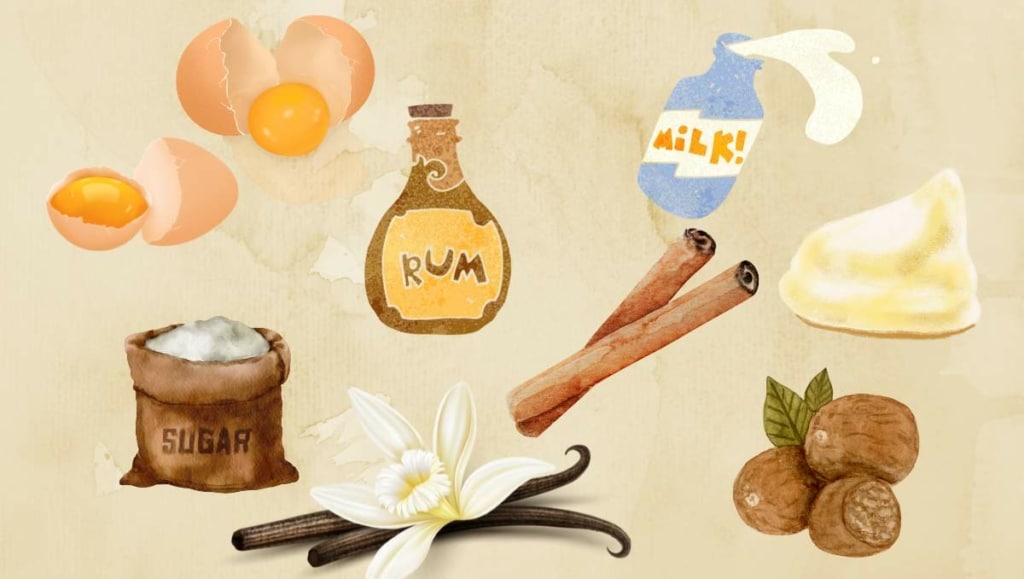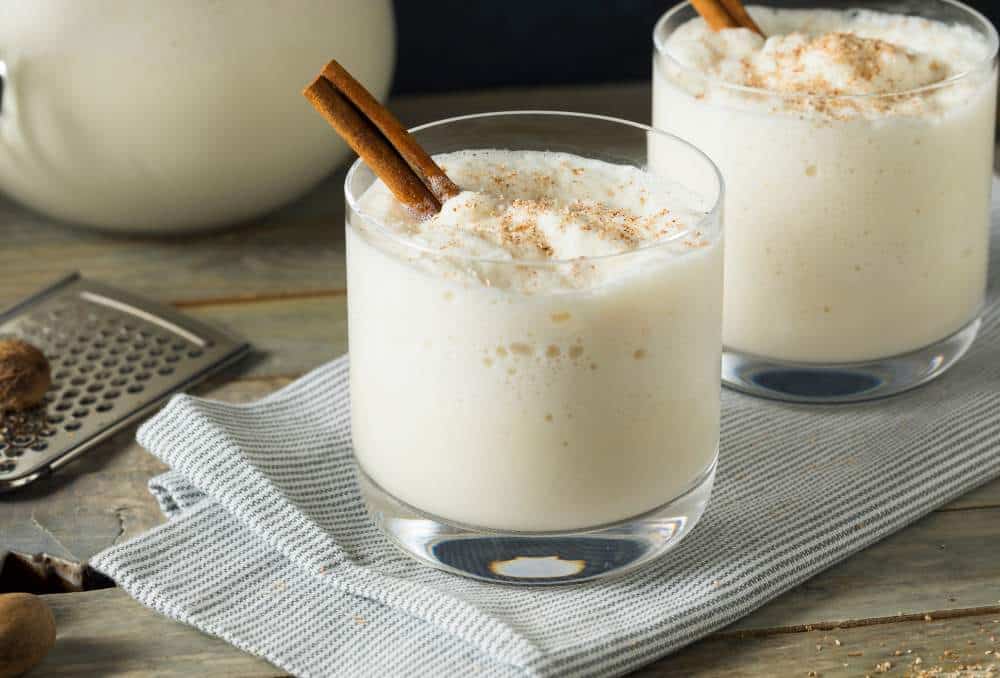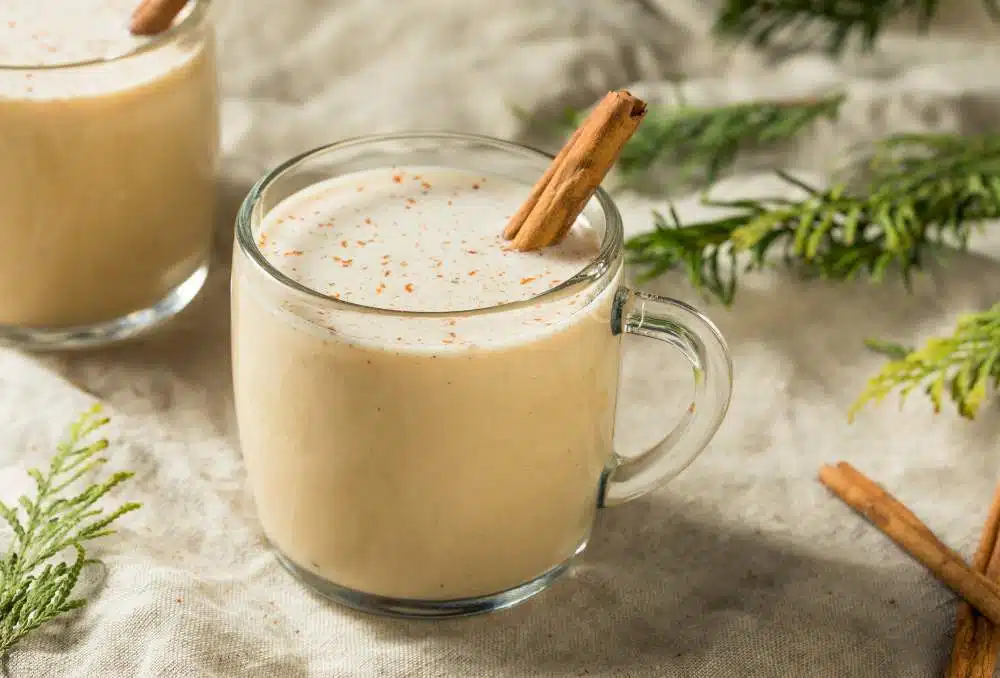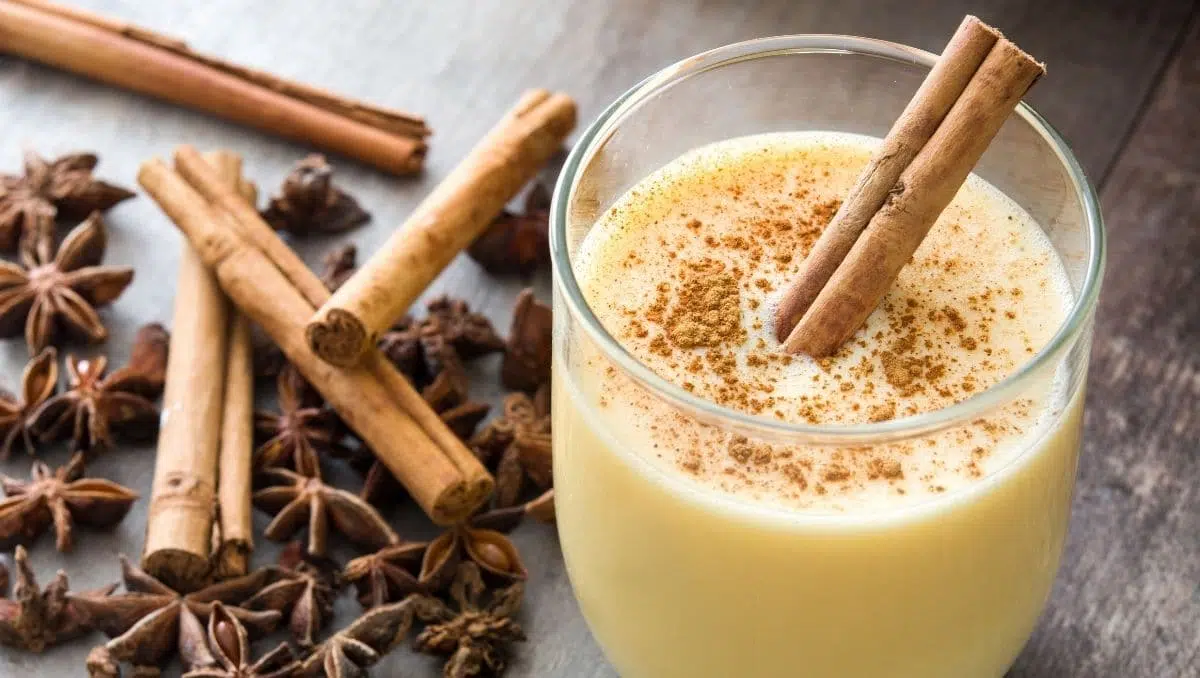Christmas isn't complete without eggnog. The delicious festive drink, historically also known as milk punch, comes in countless variations and is a staple at most holiday parties and dinners during the festive season. In brief, eggnog is a rich, creamy, dairy-based beverage made with raw egg whites and yolks, combined with various spices like cinnamon and nutmeg. There are plenty of variations on the recipe, most include liquor to spike the beverage. The most common are rum, brandy, rye whiskey, and bourbon.
But despite the love for this traditional cocktail, there are many concerns about potential health issues like salmonella linked to the consumption of raw eggs.
So, let's find out more about eggnog, what it is made of, where it came from, and if it's safe to drink.
What is Eggnog Made of?

Eggnog is a custard-like beverage made of ingredients like egg yolks, sugar, a pinch of salt, hot milk infused with spices (cinnamon & nutmeg), heavy cream, and whipped egg whites. To make it extra airy and frothy, you may add whipped cream to the milk mixture before spiking it with your spirit of choice.
Typically, the rich and creamy drink is consumed cold, but you can also enjoy it warm. -Especially if you're coming home from the cold and need a warm drink. Spiked with your favorite alcohol and spiced with vanilla, nutmeg, and cinnamon, eggnog can be the perfect winter drink.
Origin & History

Even though the history of eggnog is debatable, the roots of the creamy drink most likely are in Europe. Not only is its origin is subject of the discussion, but also the name itself is a mystery.
The Oxford Dictionary claims that eggnog derives from the word "nog", which refers to a strong beer brewed in the late 1600s. Other sources claim that nog is related to the term noggin. A noggin is a small drinking mug or cup made of carved wood that once was used to serve alcohol. But whatever the roots may be, the term eggnog is most likely an American invention. At least, that is what most researchers can agree on.
The drink itself and its ingredients go back to an old English drink called posset. Posset is a drink from the early medieval age made of hot curdled milk mixed with ale, or wine, and spices. Some recipes also included eggs. The rich drink has been popular in Britain from the 13th century until the 19th century.
During the 18th century, British colonists brought the recipe to the US. But while the English version primarily included Sherry, Madeira wine, or brandy, the colonists had to use something else. Brandy and wine were heavily taxed, so they replaced them with more affordable options like rum and bourbon.
What Alcohol is Best with Eggnog?
In general, spirits with sweet flavors like rum or bourbon work best with the rich, dairy-based beverage. Eggnog is mostly spiked with only one type of alcohol. However, our recommendation is to spike it with a blend of dark rum and aged VS or VSOP Cognac.
Are you feeling experimental? Why not try George Washington's recipe? Historians prove that Washington preferred stiff eggnogs, spiking them with brandy, whiskey, rum, and sherry. His recipe reads:
"One quart cream, one quart milk, one dozen tablespoons sugar, one-pint brandy, ½ pint rye whiskey, ½ pint Jamaica rum, ¼ pint sherry – mix liquor first, then separate yolks and whites of 12 eggs, add sugar to beaten yolks, mix well."
Eggnog Recipe Variations

Spiking eggnog with alcoholic ingredients has a long tradition. The original British version contained wine or strong ale. Later, dessert wines like Sherry or Madeira wine replaced them. Today, the most common spirits in eggnog are rum, bourbon, and brandy. And of those, brandy is the most traditional ingredient, while bourbon eggnog is the most common the United States.
But it doesn't have to stop here. Eggnog is a perfect drink to experiment with different spirits. For instance, you can also try a combination of Mezcal and Creme de cacao - perhaps even homemade Creme de cacao. Alternatively, you can do a mix of Añejo Tequila and sherry. Time to get creative!
Looking at other countries around the world, there are many different interpretations:
- In Puerto Rico, they have their own recipe called Coquito. It features rum, coconut juice, and coconut milk.
- The Mexican version, known as Rompope, uses Mexican cinnamon and rum.
- The Peruvian version is called Biblia con Pisco and uses Pisco to spike the eggnog mix.
- Also, the Germans have their take on the classic eggnog called "Eierpunsch" - a combination of white wine, water, rum, eggs, sugar, citrus juice, and spices.
Is Eggnog Safe to Drink?
The dairy-based beverage is safe to drink when using pasteurized eggs. If you're unsure about it, you can do this on your own, by "cooking" them. Well, not actually cooking them, but slowly increasing the temperature to 160°F to kill all possible bacteria.
The procedure is quite simple. In this case, as we aim to make eggnog, warm up milk in a saucepan with spices like vanilla, cinnamon, and nutmeg. Then, add the mix to your raw eggs in a bowl (not in the saucepan). Make sure to do this slowly and step-by-step. You don't want to curdle your eggs.
Once everything is combined, transfer it back into your saucepan and slowly heat it up to 160°F. Et voila, you just created a safe version of eggnog.
Using uncooked eggs in drinks is always a polarizing thing in Mixology. Using raw egg white in Sour cocktails like a Whiskey Sour or Mezcal Sour is totally safe, but eggnog can be problematic. Egg white in a sour cocktail is "cooked" by adding acidic lemon or lime juice. But in eggnog, we don't have such an ingredient. As opposed to common belief, alcohol doesn't sterilize raw eggs.
Store-bought eggnog is always safe to use, of course, as it uses pasteurized eggs when producing the eggnog. So, to be 100% safe you can use pasteurized egg for your homemade eggnog.
Can You Buy It in Stores?
Sure, store-bought eggnog is also available as pre-made version in stores. In case you crave a glass of good old eggnog and don't have time to make a batch at home, this is an excellent alternative. Pour it into your glass, sprinkle some nutmeg on it, and garnish with a stick of cinnamon.

Ingredients
- 6 large egg yolks
- 1 cup Sugar
- 2 cups Milk
- 1 cup Heavy cream
- 1 cup Liquor - (Bourbon, Rum, or Brandy)
- ½ tsp Cinnamon
- ½ tsp Nutmeg
- ½ tsp Vanilla extract
Instructions
- Add egg yolks and sugar into a large bowl and mix until well blended.6 large egg yolks, 1 cup Sugar
- Add milk, cinnamon, nutmeg, and vanilla extract into a small saucepan. Then, bring all to a low boil on medium heat while stirring.2 cups Milk, ½ tsp Cinnamon, ½ tsp Nutmeg, ½ tsp Vanilla extract
- Slowly add the mixture to the bowl with sugar and add yolk. Ensure to combine everything is thoroughly before continuing with the next step.
- Return the content of your bowl to your saucepan and heat it up to 160°F while stirring, use a thermometer for easy measuring. Then, remove the pot from the heat.
- Whisk in the heavy cream and your choice of rum, bourbon, or brandy while the mix is cooling.1 cup Heavy cream, 1 cup Liquor
- Strain the finished eggnog with the help of a fine-mesh strainer and store it in the fridge to chill before serving.
- When it's time to serve your eggnog, you can garnish it with spices like ground cinnamon, nutmeg, or a cinnamon stick.
